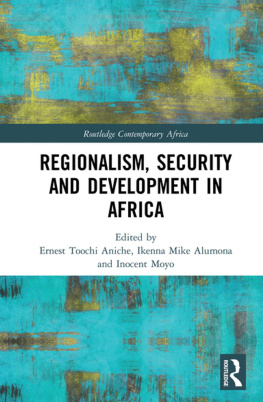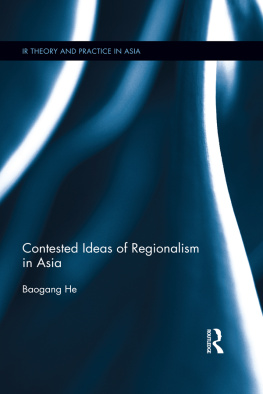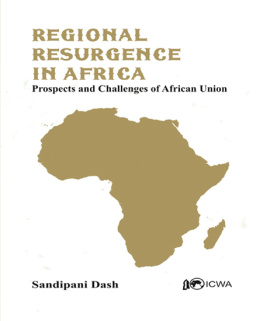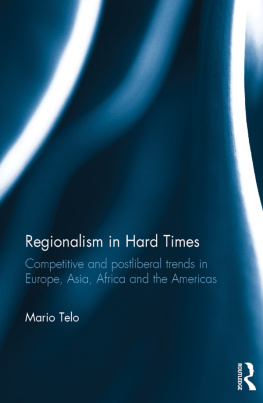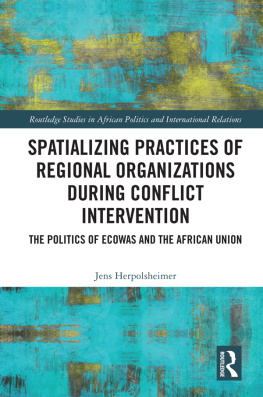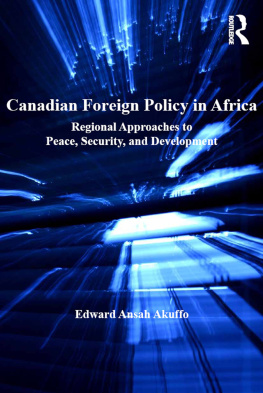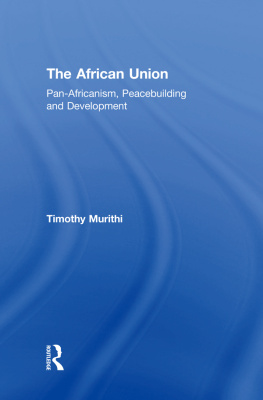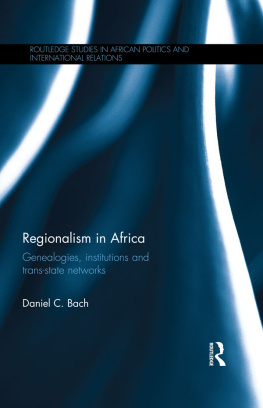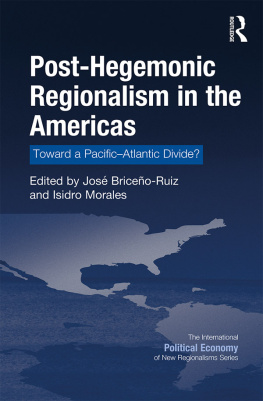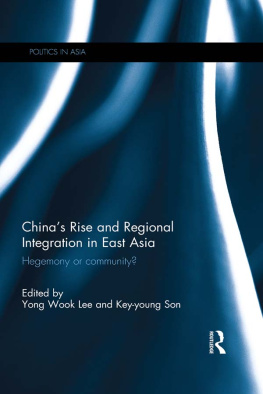Regionalism, Security and Development in Africa
This book charts the history and contemporary landscape of African regionalism, investigating how regional cooperation can be used to help tackle security and development challenges in Africa.
Africa has a long tradition of regional cooperation, with the oldest trade and monetary integration schemes in the developing world, but its colonial period and partition have caused lasting damage that can still be seen in todays African economies. Contemporary post-colonial African regionalism, deeply rooted in notions of pan-Africanism, has served as a means of collective self-reliance and economic transformation and development. This book starts with the history and theory behind African regionalism before discussing and comparing regional organisations such as the Economic Community of Central African States (ECCAS), the Economic Community of West African States (ECOWAS), the Community of Sahel-Saharan States (CEN-SAD), Southern African Development Community (SADC), the Common Market for Eastern and Southern Africa (COMESA) and the East African Community (EAC). Finally, the book considers how regional integration and cooperation can help to address security and development challenges.
This ambitious and broad-ranging book will be a valuable resource for researchers working on African regionalism, security, African integration and development, and comparative regionalism. Policymakers should also consider it a useful guide to the background and contemporary landscape of African regionalism.
Ernest Toochi Aniche is currently a Senior Lecturer in the Department of Political Science at Federal University Otuoke (FUO), Nigeria.
Ikenna Mike Alumona is an Associate Professor of Political Science at Chukwuemeka Odumegwu Ojukwu University, Nigeria.
Inocent Moyo is a Senior Lecturer and Head of the Department of Geography and Environmental Studies, University of Zululand, South Africa.
Routledge Contemporary Africa Series
The Literature and Arts of the Niger Delta
Edited by Tanure Ojaide and Enajite Eseoghene Ojaruega
Identification and Citizenship in Africa
Biometrics, the Documentary State and Bureaucratic Writings of the Self
Edited by Sverine Awenengo Dalberto and Richard Bangas
Africa and the Global System of Capital Accumulation
Edited by Emmanuel O. Oritsejafor and Allan Cooper
The East African Community
Intraregional Integration and Relations with the EU
Edited by Jean-Marc Trouille, Helen Trouille and Penine Uwimbabazi
Regionalism, Security and Development in Africa
Edited by Ernest Toochi Aniche, Ikenna Mike Alumona and Inocent Moyo
The Fourth Industrial Revolution and the Recolonisation of Africa
The Coloniality of Data
Everisto Benyera
Mobility in Contemporary Zimbabwean Literature in English
Crossing Borders, Transcending Boundaries
Magdalena Pfalzgraf
Advancing Sexual and Reproductive Health and Rights in Africa
Constraints and Opportunities
Edited by Ebenezer Durojaye, Gladys Mirugi-Mukundi and Charles Ngwena
For more information about this series, please visit: https://www.routledge.com/Routledge-Contemporary-Africa/book-series/RCAFR
First published 2021
by Routledge
2 Park Square, Milton Park, Abingdon, Oxon OX14 4RN
and by Routledge
52 Vanderbilt Avenue, New York, NY 10017
Routledge is an imprint of the Taylor & Francis Group, an informa business
2021 selection and editorial matter, Ernest Toochi Aniche, Ikenna Mike Alumona and Inocent Moyo; individual chapters, the contributors
The right of Ernest Toochi Aniche, Ikenna Mike Alumona and Inocent Moyo to be identified as the authors of the editorial material, and of the authors for their individual chapters, has been asserted in accordance with sections 77 and 78 of the Copyright, Designs and Patents Act 1988.
All rights reserved. No part of this book may be reprinted or reproduced or utilised in any form or by any electronic, mechanical, or other means, now known or hereafter invented, including photocopying and recording, or in any information storage or retrieval system, without permission in writing from the publishers.
Trademark notice: Product or corporate names may be trademarks or registered trademarks, and are used only for identification and explanation without intent to infringe.
British Library Cataloguing-in-Publication Data
A catalogue record for this book is available from the British Library
Library of Congress Cataloging-in-Publication Data
Names: Aniche, Ernest Toochi, 1978 editor. | Alumona, Ikenna Mike, editor. | Moyo, Inocent, editor.
Title: Regionalism, security and development in Africa / edited by Ernest Aniche, Ikenna Alumona,and Inocent Moyo.
Other titles: Routledge contemporary Africa series.
Description: Abingdon, Oxon ; New York, NY : Routledge, 2021. |
Series: Routledge contemporary Africa | Includes bibliographical references and index. |
Identifiers: LCCN 2020054023 (print) | LCCN 2020054024 (ebook) | ISBN 9780367862992 (hardback) | ISBN 9781003025856 (ebook)
Subjects: LCSH: RegionalismAfrica. | Security, InternationalAfrica. | Economic developmentAfrica. | AfricaEconomic integration.
Classification: LCC JQ1873.5.R43 R435 2021 (print) | LCC JQ1873.5.R43 (ebook) | DDC 327.6dc23
LC record available at https://lccn.loc.gov/2020054023
LC ebook record available at https://lccn.loc.gov/2020054024
ISBN: 978-0-367-86299-2 (hbk)
ISBN: 978-0-367-69411-1 (pbk)
ISBN: 978-1-003-02585-6 (ebk)
Typeset in Baskerville
by codeMantra
Part I
History and theory of African regionalism
Samuel Osagie Odobo
Introduction
Regionalism developed as a vital component of Africas interstate relations as colonialism wound down. It has remained an important element in the continents development approach to promote inclusive economic, political and socio-cultural development. African regionalism developed from a pan-Africanist philosophical consciousness that African states share a common set of historical, political, economic and sociocultural problems, the resolution of which is closely linked with African unity. In essence, regionalism is essential to the pan-African aspiration of creating a United States of Africa integrated and strong enough to contest Africas global marginalisation and improve the continents economic, security and political performance. From this aspiration developed both supranational and sub-regional integration initiatives aimed at restructuring and uniting the continent politically and economically.
More than five decades of integration efforts in Africa, the actualisation of integration remains largely unfulfilled. African regionalism has not yielded satisfactory results, unlike in other regions where integration efforts have successfully improved their economies (Mattli, 1999). African markets remain structurally fragile, non-industrialised and primary commodity-based. Trade amongst African nations, as at 2017, remained abysmally little at 15% compared to trade with others as shown by AFREXIMBANK report (2018, p. 15). Africa appears stuck in what Olivier (2010, p. 17) has referred to as the phase of shallow integration, in spite of the existence of a number of initiatives to promote African integration.

